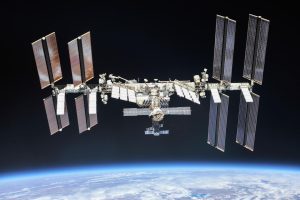A crew mission has been delayed until next Wednesday at the earliest.
There's another leak on the International Space Station, and NASA has already delayed one crew launch to the orbiting laboratory as a result.
Beyond that, the space agency is not offering much information about the unfolding situation in orbit. However, multiple sources have confirmed to Ars that the leak is a serious concern for the space agency as it deals with hardware that is approaching three decades in orbit.
To understand the current situation, it is important to review past leaks on the station, which has an aluminum structure. The station has had a slowbut increasing leak since 2019. The air leaks are located in the transfer tunnel of the space station's Russian Zvezda service module, one of the oldest elements of the complex, the first elements of which were launched in 1998. The transfer tunnel, known by the Russian acronym PrK, connects the Zvezda module with a docking port where Soyuz crew and Progress resupply spacecraft attach to the station.
From time to time, Russian cosmonauts have experimented with repairs to the small cracks, but they have generally only slowed the progression of the leak, which amounts to a couple of pounds of air per day. The best solution has been to close the hatch leading to the PrK module except when spacecraft dock with the attached port.
Roscosmosrecently confirmedthat it completed its most recent repairs on the PrK module earlier this month, saying it had been "completely sealed." NASA has also said that repairs were recently wrapped up. After this, both Roscosmos and NASA said the leak rate inside the PrK module had halted.
This seems like good news. However, the overall air pressure in the space station at large continued to drop, according to two sources. So if the PrK module was not leaking, as it had been doing for half a decade, why was the space station still losing air pressure?
No one is certain. The best guess is that the seals on the hatch leading to the PrK module are, in some way, leaking. In this scenario, pressure from the station is feeding the leak inside the PrK module through these seals, leading to a stable pressure inside—making it appear as though the PrK module leaks are fully repaired.
At this point, NASA is monitoring the ongoing leak and preparing for any possibility. A senior industry source told Ars that the NASA leadership of the space station program is "worried" about the leak and its implications.
This is one reason the space agency delayed the launch of a commercial mission carrying four astronauts to the space station, Axiom-4, on Thursday.
"The postponement of Axiom Mission 4 provides additional time for NASA and Roscosmos to evaluate the situation and determine whether any additional troubleshooting is necessary," NASAsaid in a statement. "A new launch date for the fourth private astronaut mission will be provided once available."
One source indicated that the new tentative launch date is now June 18. However, this will depend on whatever resolution there is to the leak issue.
The worst-case scenario for the space station is that the ongoing leaks are a harbinger of a phenomenon known as "high cycle fatigue," which affects metal, including aluminum. Consider that if you bend a metal clothes hanger once, it bends. But if you bend it back and forth multiple times, it will snap. This is because, as the metal fatigues, it hardens and eventually snaps. This happens suddenly and without warning, as was the case with anAloha Airlines flight in 1988.
The concern is that some of these metal structures on board the station could fail quickly and catastrophically. Accordingly, in its previous assessments,NASA has classifiedthe structural cracking issue on the space station as the highest level of concern on its 5v5 risk matrix to gauge the likelihood and severity of risks to the space station.
In the meantime, the space agency has not been forthcoming with any additional information. Despite many questions from Ars Technica and other publications, NASA has not scheduled a press conference or said anything else publicly about the leaks beyond stating, "The crew aboard the International Space Station is safely conducting normal operations."
